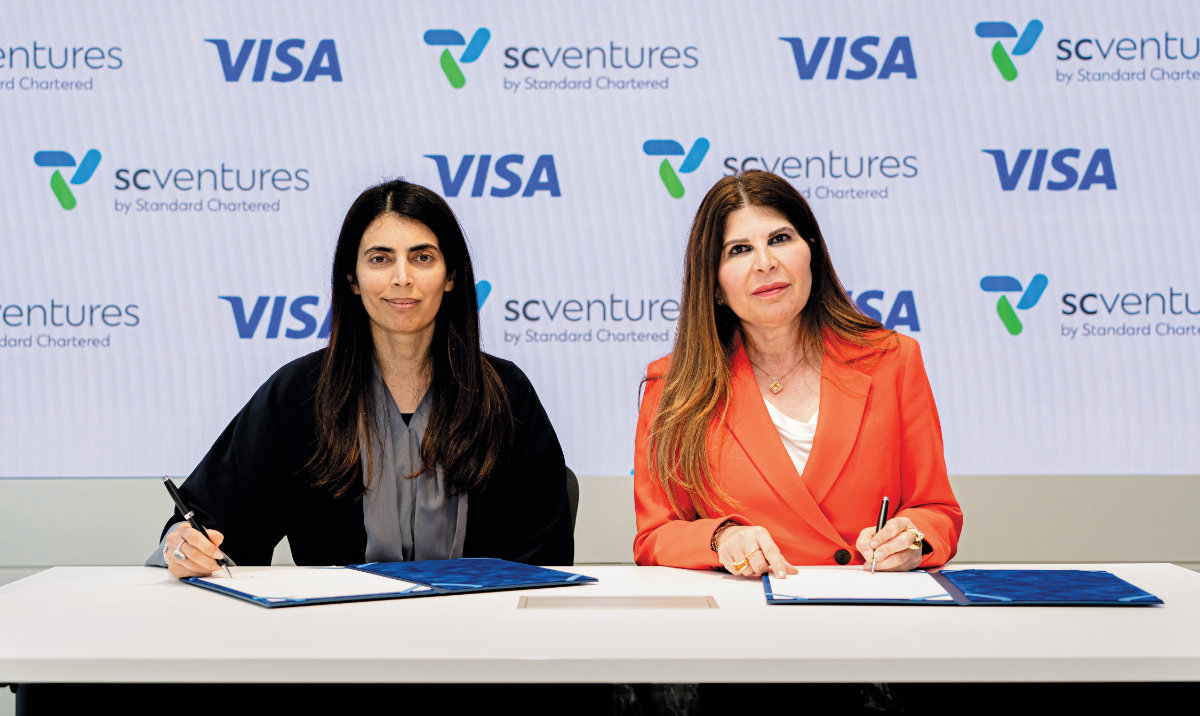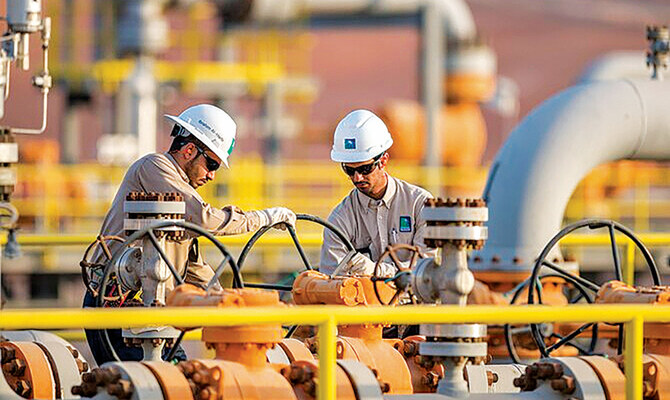RIYADH: Saudi Arabia’s investment landscape continues to expand across diverse sectors, with industry leaders participating in global funding rounds, driving innovation beyond the Middle East and North Africa region.
Aramco Ventures has led a $30 million Series A funding round for US-based climate tech startup Spiritus, joined by Khosla Ventures, Mitsubishi Heavy Industries America, and TDK Ventures.
The investment will help Spiritus scale its direct air capture technology, designed to reduce carbon emissions from data centers and industrial construction without slowing expansion.
“We’re seeing soaring demand for data centers and heavy industries, yet we can’t ignore the carbon that comes with it,” said Charles Cadieu, CEO and co-founder of Spiritus.
“Our DAC technology brings large-scale decarbonization within reach. This funding advances our vision of supporting America’s explosive growth while keeping emissions in check,” he added.

SC Ventures has signed a memorandum of understanding with Visa to develop digital solutions for SMEs across the MENA region.
Bruce Niven, executive managing director of strategic venturing at Aramco Ventures, said that direct air capture has the potential to play an important role in decarbonizing hard-to-abate sectors of the economy, but until now, it has been too expensive to be meaningful.
“Breakthrough approaches like Spiritus are needed. We are excited to partner with Spiritus and bring this important technology to market,” Niven added.
Talabat acquires Instashop from Delivery Hero for $32m
Kuwait-born and UAE-based q-commerce and food tech platform Talabat has completed the acquisition of 100 percent of Instashop from Delivery Hero SE for $32 million.
The acquisition strengthens Talabat’s grocery and retail segment while expanding its partner network across the MENA region.
Instashop, founded in 2015 by John Tsioris, will continue to operate as an independent brand under Talabat’s grocery and retail division.
The platform connects users with vendors in the UAE, Bahrain, Egypt, Lebanon and Qatar and has an annual gross merchandise volume of $300 million.
Talabat, founded in 2004, was acquired by Rocket Internet in 2015 for $170 million and operates in the UAE, Oman, Qatar, Bahrain, Jordan, Iraq, and Egypt.
SC Ventures and Visa partner to support SMEs in MENA
SC Ventures, the fintech investment and innovation arm of Standard Chartered, has signed a memorandum of understanding with Visa to develop digital solutions for small and medium-sized enterprises across the MENA region.
The partnership was formalized at a signing ceremony at the Visa Innovation Center in Dubai.
Rola Abu Manneh, CEO of Standard Chartered Middle East, UAE, and Pakistan, and Saeeda Jaffar, Visa’s senior vice president and group country manager for the GCC, highlighted their commitment to fostering SME growth in the UAE and beyond.

Breakthrough approaches like Spiritus are needed. We are excited to partner with Spiritus and bring this important technology to market.
Bruce Niven, executive managing director of strategic venturing at Aramco Ventures
LoftyInc. Capital Management secures $43m first close for Africa-focused fund
LoftyInc. Capital Management has secured $43 million in the first close of its LoftyInc. Alpha Fund, a late-seed investment vehicle targeting startups in Nigeria, Egypt, Kenya, and Francophone Africa.
The fund has attracted backing from African and international investors, including sovereign wealth funds, development finance institutions, and high-net-worth individuals.
Key investors include Egypt’s Micro, Small, and Medium Enterprises Development Agency, Tunisia’s Anava Fund of Funds, and the Dutch Entrepreneurial Development Bank, as well as Proparco with FISEA.
The International Finance Corp., AfricaGrow, the Dutch Good Growth Fund, and US-based First Close Partners were also investors.
Capital Haus acquires 11.6 percent stake in Equity Story Group
UAE-based financial concierge firm Capital Haus has acquired an 11.6 percent strategic stake in Equity Story Group Ltd., pushing its total assets under management beyond $1 billion.
The investment aligns with Capital Haus’ focus on delivering alternative wealth management solutions for high-net-worth individuals and corporate investors.
As part of the deal, Brendan Gow, founder and managing director of Capital Haus, has been appointed as an executive director on the board of Equity Story Group.
“With the UAE’s emergence as a leading global wealth hub, investors are increasingly looking for alternative asset classes, cross-border investment access, and concierge-style financial services,” the press release stated.
Egypt’s Mrkoon raises bridge funding from A Ventures
Egypt-based waste management platform Mrkoon has secured bridge funding from A Ventures, increasing the investment firm’s stake in the startup to 28 percent.
The funding will support Mrkoon’s regional expansion, with plans to enter the Gulf Cooperation Council market.
Founded in 2022 by Mohamed Shalabi, Ahmed Mamdouh, and Ahmed Amir, Mrkoon operates a business-to-business platform that enables enterprises, particularly in the industrial and manufacturing sectors, to offload surplus materials and scrap.
A Ventures, an Egypt-based investment and portfolio management firm, was established in 2024 by Sherif Ramadan and Ayman Abbas.
BILRS secures funding from Salica Spring Studios
UAE-based fintech BILRS has raised an undisclosed funding round from Salica Spring Studios, backed by Al-Waha Fund of Funds.
The investment will help the company expand its operations, enhance its technology, and grow its global reach.
Founded in 2022 by Rupert Shaw, BILRS provides international bill payment solutions, mobile top-ups, and gift cards, enabling seamless cross-border transactions in the B2B space.
The company previously secured pre-seed funding from Haatch in 2023.
Foras secures stake in crowdfunding platform Beban
UAE-based investment firm Foras has acquired a 36 percent stake in Beban, a Bahrain-based crowdfunding platform, for an undisclosed amount.
The investment aims to enhance access to capital for startups and entrepreneurs across the region.
Founded in 2022, Beban is a subsidiary of Hope Ventures and is licensed by the Central Bank of Bahrain.
The platform connects entrepreneurs with investors to drive business growth in the MENA region.
FanTV raises $3m in Series A funding
UAE-based artificial intelligence-powered content platform FanTV has secured $3 million in a Series A funding round from Mysten Labs, Cypher Capital, CoinSwitch Ventures, and Illuminati Capital.
The funding will support the company’s expansion efforts and the enhancement of its AI-driven tools for content creators.
Founded in 2022 by Prashan Agarwal, FanTV operates as a Web 3.0 content platform that allows creators to upload and monetize content based on viewership.
The company aims to scale its user base and technological capabilities globally.
MENA funding grows fivefold in Feb
Investment in MENA startups surged nearly fivefold in February, reaching $494 million across 58 deals, according to Wamda.
The sharp increase was driven by a shift from debt financing, which fell to 15 percent of total funding compared to 90 percent in January. Excluding debt, equity investments rose 371 percent month-on-month.
Saudi Arabia led with $250.3 million across 25 deals, followed by the UAE with $203.5 million from 15 deals and Egypt with $27.5 million across eight transactions. Smaller investments were recorded in Oman, Morocco, and Jordan, as well as Tunisia, Bahrain, and Qatar.
Fintech dominated with $274 million across 15 deals, followed by insurance tech with $55 million, and logistics with $28.5 million.
Marketing tech, education tech, AI, and clean tech also saw significant funding.
Later-stage rounds gained traction, with Tabby securing $160 million in Series E funding, Flow48 raising $69 million, and Applied AI closing $55 million.
Despite the funding surge, gender disparity persisted, with female-founded startups receiving just $200k — 0.04 percent of total investment — while male-led ventures secured 86.7 percent of funding.




















